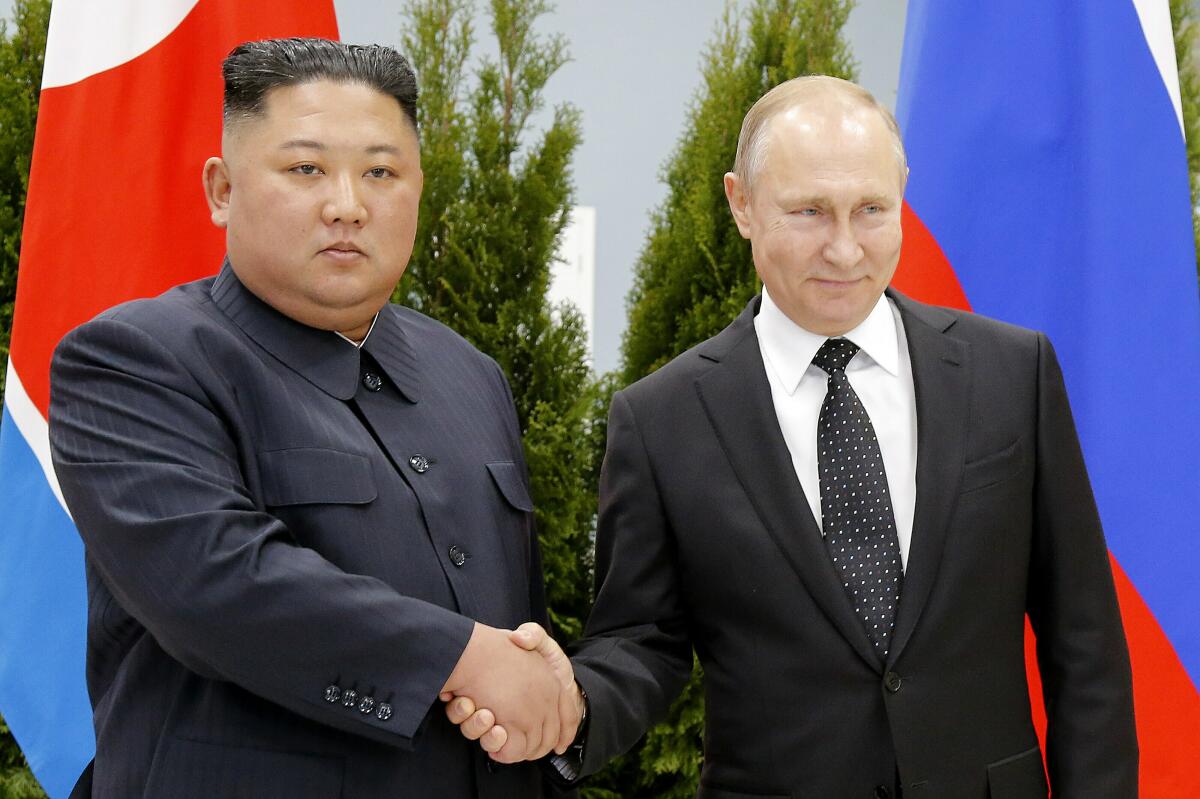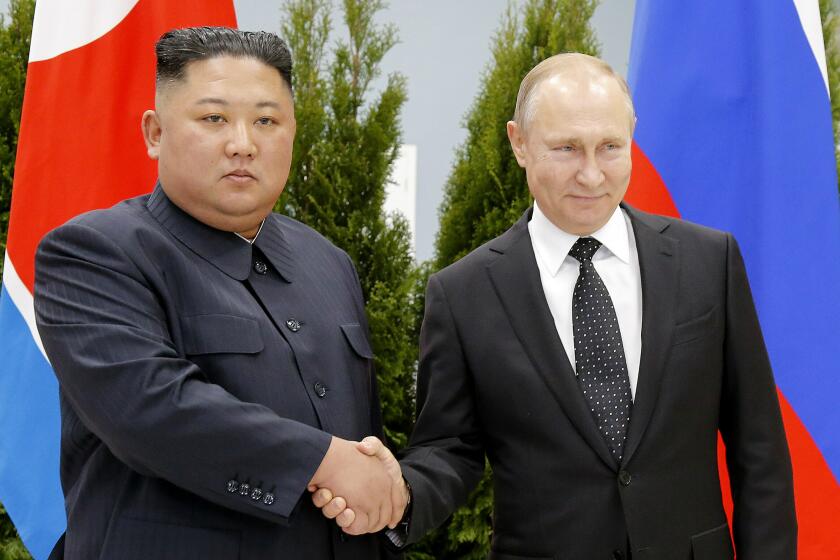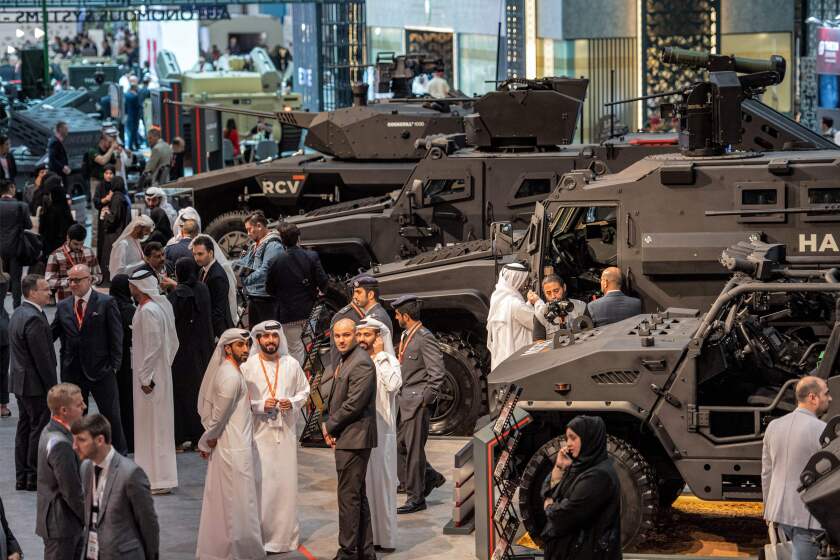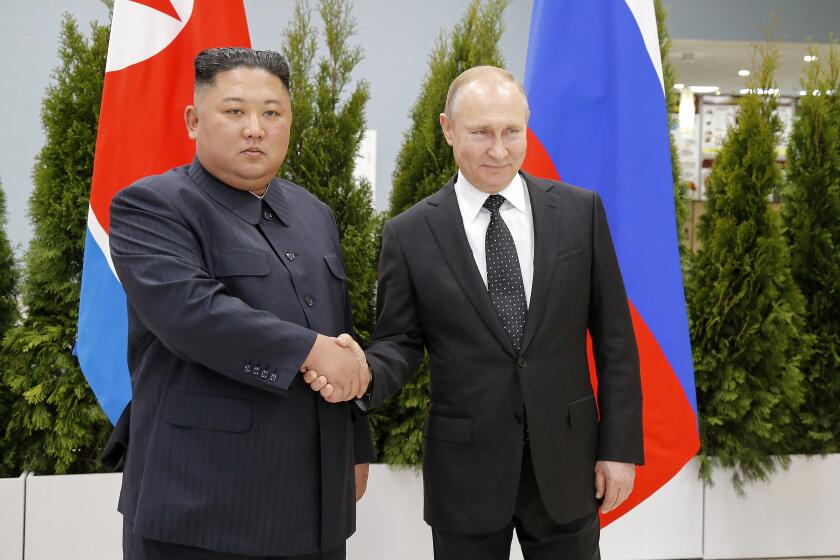Kim Jong Un and Vladimir Putin may meet soon. Each has his own demands

- Share via
SEOUL — A potential visit by North Korean leader Kim Jong Un to Russia for a summit with President Vladimir Putin, a meeting that a U.S. official said could happen this month, underscores the deepening cooperation between two isolated leaders who are locked in separate confrontations with Washington.
U.S. officials say Russia is seeking to buy ammunition from North Korea to refill reserves drained by its war in Ukraine. In return, experts say, North Korea will likely want food and energy shipments and transfers of sophisticated weapons technologies.
A meeting with Putin would be Kim’s first summit with a foreign leader since North Korea closed its borders in January 2020 due to the COVID-19 pandemic. They met for the first time in April 2019, two months after Kim’s high-stakes nuclear diplomacy with then-President Trump collapsed.
In July, Russian Defense Minister Sergei Shoigu traveled to Pyongyang, the North Korean capital, where he asked Kim to send more ammunition to Russia, U.S. officials said. Shoigu reportedly said Moscow and Pyongyang were considering holding joint military exercises for the first time.
It’s unclear how far the two countries’ military cooperation might go, but any sign of warming relations is concerning to their rivals,
including the United States and South Korea. Russia seeks to quash a Ukrainian counteroffensive and continue its war there, and North Korea is continuing its record pace of missile testing, in part to protest U.S. moves to reinforce its own military alliances with South Korea and Japan.
Here’s a look at what Kim’s possible trip to Russia would mean:
What does Russia want from North Korea?
Since last year, U.S. officials have suspected that North Korea is providing Russia with artillery shells, rockets and other ammunition, many of which are likely copies of Soviet-era munitions.
“Russia is in urgent need of [war supplies]. If not, how could the defense minister of a powerful country at war come to a small country like North Korea?” said Kim Tae-woo, former head of Seoul’s Korea Institute for National Unification. He said Shoigu was the first defense minister from Moscow to visit North Korea since the 1991 disintegration of the Soviet Union.
North Korea denied U.S. allegations that it is shipping artillery shells and ammunition to Russia for use in its war against Ukraine.
Buying munitions from North Korea would be a violation of Russian-supported United Nations resolutions that ban all arms trade with the isolated country. But now that Russia faces international sanctions and export controls over its war in Ukraine, the Kremlin has been seeking weapons from other sanctioned countries like North Korea and Iran.
North Korea has vast stores of munitions, but Cha Du Hyeogn, an analyst at Seoul’s Asan Institute for Policy Studies, doubts that it could swiftly send significant amounts to Russia, because the narrow land link between the countries can handle only a limited amount of rail traffic.
What does Kim want in return?
Kim’s priorities would be aid shipments, prestige and military technology, experts said.
“It would be a win-win deal for both, as Putin is cornered over his exhausted weapons inventory, while Kim faces pressure from the South Korea-U.S.-Japan trilateral cooperation,” said Nam Sung-wook, a former director of the Institute for National Security Strategy, a think tank run by South Korea’s spy agency. “Their needs are matched perfectly now.”
Pandemic-era border closures have left North Korea with severe economic difficulties, and Kim is likely to seek supplies of food and energy to address shortfalls.
Kim will likely also trumpet expanding relations with Moscow as a sign that the country is overcoming its years of isolation. North Korean leaders have long valued face-to-face meetings with world leaders as signs of international importance and for domestic propaganda purposes.
The war in Ukraine has jacked the global arms trade, fueling a new appetite for materiel not just in Moscow and Kyiv but also around the world.
Kim is likely also seeking Russian technology to support his plans to build high-tech weapons systems such as powerful long-range missiles, hypersonic ballistic weapons, nuclear-powered submarines and spy satellites, said Hong Min, an analyst at Seoul’s Korea Institute for National Unification.
It’s unclear whether Russia would be willing to provide North Korea with advanced technologies related to nuclear weapons and intercontinental ballistic missiles, Cha said. Russia has always tightly guarded its most important weapons technologies, even from key partners like China, he said.
How close could the two countries get?
Shoigu told reporters Monday that Russia and North Korea were pondering the possibility of bilateral military exercises. Earlier, South Korea’s spy agency told lawmakers that Shoigu appeared to have proposed a trilateral training exercise involving China.
Either way, it would be North Korea’s first joint military drills with a foreign country since the unofficial end of the 1950-53 Korean War. The North has avoided training with foreign militaries, in line with its official philosophy of juche, or “self-reliance.”
Kim Tae-woo, the former Institute for National Unification director, said expanding South Korea-U.S.-Japan security cooperation may prompt Kim Jong Un to break from that taboo and hold drills with Russia and China for the first time.
North Korea is hinting at its interest in sending construction workers to help rebuild Russian-occupied territories in eastern Ukraine.
But Nam, a professor at Korea University, said North Korea probably wouldn’t do so, as that could leave it even more dependent on Beijing and Moscow.
Park Won-gon, a professor at Seoul’s Ewha Womans University, said it’s too early to predict what Kim’s diplomacy might yield, beyond making a show of defiance against the U.S.
“In any case, North Korea and Russia need to show that they’re working together, that they’re stepping up this cooperation,” Park said. “There clearly are practical areas of cooperation, and also some symbolic aspects they want to show to the United States.”
More to Read
Sign up for Essential California
The most important California stories and recommendations in your inbox every morning.
You may occasionally receive promotional content from the Los Angeles Times.













